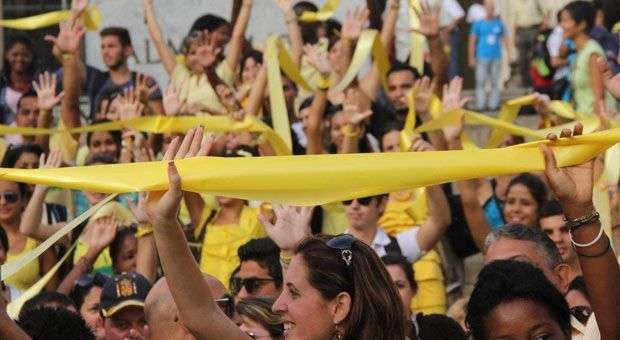Four of the five Cuban security agents imprisoned in the United States, serving visibly excessive sentences for the legal violations they committed still remain there. Among manydecent reasons, which were then publicly crucified with laudatory campaigns and posters, one might wonder whether the initiative proposed by René González, sending a message to the American people through their own symbols, is really genuine.
Cuba has used many times a generous idea as confirmation of a system, a particular conflict as an icon of a whole, of a unanimous welfare, and therefore the question is notoutlandish. The child Elián had to return to Cardenas, but that did not mean, as we now know, and as it was said, that socialism would have an irreversible character.
Rene Gonzalez’s proposal is, in principle, wise, perhaps the most sensible proposal at propagandistic level this crusade has had. There is a direct relationship between gloating and clumsiness as methods and freedom as an end. For each symposium on the Cuban Five organized in Los Arabos or Camajuaní, for every opportunist who dedicated them a diplomain the CDR (Spanish acronym for Committees for the Defense of the Revolution) or ANAP (National Association of Small Farmers), for each punctilious and useless nationalrepetition, these men accumulated a month in jail, lost one more meter of space, or a light quadrant.
You can not believe too much to newspapers and news that every three weeks, for the most convoluted reason, convene for a meeting. I understood-tossing aside my growingskepticism, that the proposal of René González was a genuine proposal when I found offenders from Centro Habana municipality, who have nothing to lose, and therefore nothing tosimulate, dressed in yellow without that to imply a homage to Oshun. M ulatto women wearing yellow headbands and blouses and men with shirts or T-shirts in the same color, despite many wore ridiculous signs. But we will have to forgive this exotic detail .
The success of this event demonstrates not only that, its success, but also the complete failure of the previous ones. How could René Gonzalez’s proposal have such massive naturewithout the help of the trade unions, and so spontaneous large-scale demonstration, despite unions? The general impression is that this man had to come, who obviously knew what he was saying, and what he was feeling, to take his own cause and rescue it from the muddy advertising in which it had been sunk by the socialism marketing.
Let us read an excerpt of his speech, televised on September 3rd: “I have only one personal exhortation for the people (…) I want the country, on September 12, full of yellow ribbons and that foreign visitors or correspondents who will be on the island can not ignore that. I wish that day the entire island to shake and that yellow ribbons to appear on trees, balconies, in people, everywhere, in pets, as you decide, I want these yellow ribbons to fill the country for this event can not be ignored, for the whole world to know that the Cuban people are waiting for four of their sons who are imprisoned in the United States. “
The message is quite simple . It speaks to people providing them a margin for choosing and even for non- choosing and consciously turns away from our variegated and tediousofficial symbolism, from the haughty speech of the Revolution. There is a phrase from a chronicle of Carpentier that was published in Social in the 1920s, and that should hang on a poster next May 1 st from the top of the National Library: “Grandiloquence is anti-human.”
René González remained imprisoned for fifteen years, enough proof that he not only knows the pain, the way how it is expressed, but also that pain is precisely its form, the gestureitself. Chekhov did not say that his character was sad; he put him to watch the moon. As I see it, the speech of René González has questioned to more than a fan of distress. Has challenged dozens of well-meaning persons, who have yet learned that solidarity can not be manifested in the way politicians speak, because that is not solidarity, is politics; and has also questioned dozens, thousands of evil human beings that neither feel nor suffer, but have sufficient mischievousness to become ideologically reliable, because they need to savea position, a small or medium privilege.
From the little I know about literature and history -that fiction-no relevant prisoner has ever expressed regret ostentatiously. Some do not even mention it. If not for Josefina Licitra, we would not have found out that Pepe Mujica, at around the decades of the seventies and the eighties of last century, talked on his cell with ants. When we read something like this : that the confinement of a Tupamaro guerrilla and the pain of a lost cause result in an intimate dialogue with ants, in so- seemingly- insubstantial detail, we have the right to doubt our own ways.
After the multitudinal concert offered by several artists and some fashionable hucksters last Thursday on behalf of the Five, and after the passionate improvisation of RoberticoCarcasses, someone canceled the upcoming presentations of the band Interactivo. Let us not abound in the incident, but Carcasses is not in any case, by saying what he told(“electing the president by direct vote and not by other way (…) neither militants nor dissidents, Cubans all, with the same rights and I wish the blockade, and the self-blockade to end”), an opportunist or a mercenary, as he was rated by some offended people.
If so, if anyone, protected by a power and an arrogance that at least Cubans have not approved, prohibits the presentations of Interactivo during the following months, we would have to admit that in the name of freedom of some, the freedom of others is suppressed, and the logic that condemns five Cuban security agents to excessive sentences, solely and exclusively for being Cubans, is the same logic that ruthlessly censures the audacity of an artist, even though boldness disturb them .
The fact that those people who so fervently endorsed the initiative of the yellow ribbons, now do not claim with the same passion Carcassés´ integrity, is a sign of our unblemishedopportunism, and of an unconscionable cowardice. The worst of Cuban polarization is the comfort of its ends, but the best is the most deeply true that can be said today about the country; Cubans must shout in no man’s land without deliberately searching for approval. No matter that you can not be heard, no matter that you have no reference among so many noises.
The highest expression we can achieve as a nation is being reached by a stranger, with his loudly silence, but he can not be heard today. We will realize of that twenty years later, because that stranger, any of us, has given up the marketing, has placed his body in an untouched stretch of water, free of carrion and jackals, and is paying the price of his truth.










